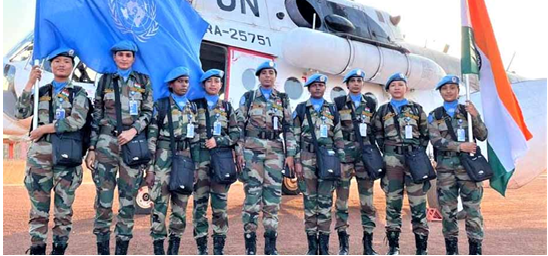United Nations peacekeeping
United Nations peacekeeping is a key mechanism used by the UN to help countries torn by conflict create conditions for lasting peace.
It involves deploying military, police, and civilian personnel—often called "Blue Helmets" or "Blue Berets"—to support and implement peace processes and agreements, protect civilians, assist in disarmament, and strengthen governance and rule of law in post-conflict areas.
- Since 1948, UN Peacekeepers have undertaken 71 Field Missions.
Historical Backgroung
UN peacekeeping began in 1948 with the UN Truce Supervision Organization (UNTSO) in the Middle East. Since then, over 70 missions involving more than two million personnel from around 125 countries have been conducted across Africa, Asia, Europe, the Middle East, and the Americas
Principles of UN Peacekeeping operation
- Consent of the conflicting parties to deploy peacekeepers
- Impartiality, avoiding favoring any party.
- Limited use of force, primarily for self-defense or to protect the mandate.
India’s contribution to UN Peacekeeping
- India has a distinguished and longstanding role in United Nations peacekeeping operations, dating back to the early 1950s.
- It is one of the largest contributors of troops and police personnel to UN peacekeeping missions worldwide, with participation in over 49 missions having deployed over 300,000 peacekeepers throughout its history.
- India has also provided, and continues to provide, eminent Force Commanders for UN Missions.
- India ranks third after Bangladesh (7,237) and Nepal (6,264) in troops contribution.
- Indian peacekeepers have faced significant risks; over 170 have died in the line of duty while serving under the UN flag, honored with highest commendations
- It have participated in major peacekeeping operations including Korea (1953), Middle East (UN Emergency Force 1956-67), Congo (ONUC 1960-64), Indochina, and more contemporary missions in countries like South Sudan, Lebanon, and Liberia.
- In April 2019, a total of 150 Indian peacekeepers serving with the UN Mission in South Sudan (UNMISS) have received medals of honour for their dedicated service and sacrifice.
- In August 2021, India, in collaboration with the UN launched UNITE AWARE platform.
- It is a technology platform to ensure the safety and security of peacekeepers.
- Training and Support:
- India has established the Centre for United Nations Peacekeeping (CUNPK) in New Delhi, providing specialized training to enhance the effectiveness of peacekeepers.
- The Indian Army supplies indigenously manufactured modern equipment and vehicles for its peacekeeping contingents to operate in diverse and challenging environments.
Role of Indian women in Peacekeeping
- India was the first to deploy an all-women Formed Police Unit to the UN mission in Liberia in 2007 and continues to promote gender diversity within its peacekeeping contingents.
- As of early 2025, India continues its legacy with over 150 women peacekeepers deployed across six key UN missions, including the Democratic Republic of Congo, South Sudan, Lebanon, Golan Heights, Western Sahara, and Abyei in Sudan.
Additional services offered by India
- Medical camps – Medical care is among the many services Indian Peacekeepers provide to the communities in which they serve on behalf of the Organization.
- Veterinary support – They also perform specialised tasks such as veterinary support and engineering services.
In summary, India is one of the UN’s most significant and experienced contributors to peacekeeping, offering troops, police, leadership, training, and capacity building, with a legacy marked by high standards of professionalism and sacrifice in furthering international peace and security.
Download Pdf
